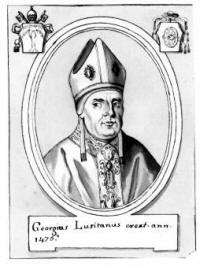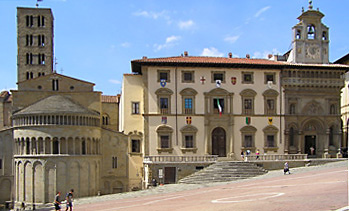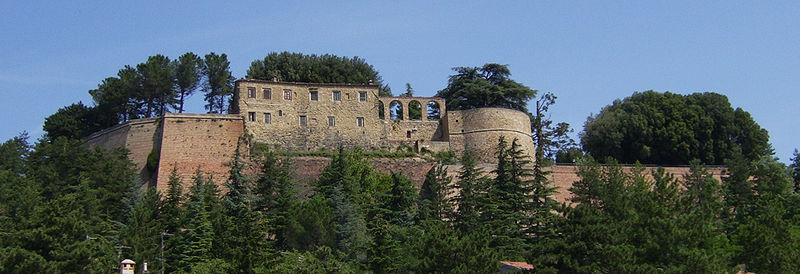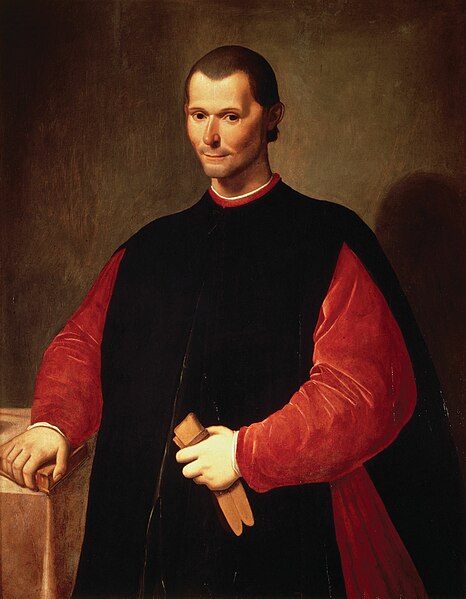 |
| Borgia coat of arms |
Rumours Abound
The stories
about Borgia depravity and of the orgies held in the Vatican may have been just
that, stories and many seem to have circulated after the death of Rodrigo.
There is evidence to show that famous orgy scenes from Burchard may have been
inserted at a later date[i]. It is highly possible
that this was at the orders of Rodrigo’s successor to the papacy, Cardinal
della Rovere.
One Venetian
envoy informed the Senate in Venice that Rodrigo led an orderly life and did
not do what had been said (si dice)
of him. Alexander was well aware of the slanders but, unlike Cesare and others
before and after him, rarely attempted to enforce his own version of events. In
late January 1502 action was taken while Rodrigo was out of the city;
‘The brother of Don Giovanni
Lorenzi was arrested on the charge of having been furnished with letters
written in Greek by Don Giovanni against the pope and Don Cesare Borgia, and of
having transcribed them into Latin for the Venetians.’[ii]
The Signoria
requested Don Lorenzi’s return on 31st January but Rodrigo politely
declined their request; Don Lorenzi had been strangled and thrown in the Tiber,
retribution possibly being ordered by Cesare.
The Despoliation of the Kingdom of Naples
Rodrigo
ordered that all assistance was to be given to the French army victuallers. The
French had been taking what they wanted rather than paying for it making them
exceedingly unpopular. The French
left Rome on 29th 1501 June and papal troops followed on 3rd
July; on 4th August the French commander, Yves d’Aubigny entered
Naples by agreement with Frederick;
‘The French commander was to
take possession of all the fortresses of Naples, whilst King Federigo was to be
allowed to reside in Ischia for six months, during which time he could defend
himself if he received arms and men from anyone to help him.’[iii]
 |
| Sermonetta |
Frederick
was then allowed to retire to Anjou where he spent the last three years of his
life peacefully[iv].
In the
meantime Rodrigo had been touring the lands formerly owned by the Colonna
family visiting Sermoneta, Genazzano and Frascati. He had been accompanied by Cardinals
Serra[v], Ludovico and Francesco Borgia. During
his absence Lucrezia had Rodrigo’s authority to deal his correspondence.
Another Beginning
 |
| Alfonso d'Este |
On 31st
December 1501 Lucrezia was wed again, this time to Alfonso d’Esté, eldest son of the Duke of Ferrara. The negotiations with Duke Ercole
had been lengthy; Lucrezia had refused at least one suitor on her return to
Rome and had shut herself up in a convent.
Rodrigo paid
out 100,000 gold ducats[vi] to the bridegroom’s
brothers as part of Lucrezia’s dowry; a further 75,000 ducats[vii] was spent on clothes,
jewels, silver and other goods and Rodrigo forced his cardinals to agree to a
lowering of Ferrara’s tribute to the church.
‘The pope held a secret
consistory on the Friday, and in it, with the consent of all the cardinal’s
present, he remitted the annual payment of four thousand ducats[viii]
made by the Duke of Ferrara to the Apostolic Chamber, cancelling it for the
duke and his successors to the third generation, leaving only a nominal sum of
one hundred ducats[ix] to be paid each year.’[x]
The marriage
agreement was signed at the Vatican on 26th August; the dickering
over the dowry between Rodrigo and Duke Ercole had been ongoing since
December.
 |
| Cardinal Costa |
The
bridegroom had only been persuaded to marry a woman whose reputation was
greatly sullied[xi],
by being informed that if Alfonso failed to step up to the mark his father
would have to marry Lucrezia.
On 24th
January 1502, at a secret consistory Cardinal da Costa and the proctor for Cardinal della Rovere both resigned the
perpetual administration of the church in Bologna. Rodrigo removed the two
fortresses of Cento and Pieve di Cento and added them to Lucrezia’s dowry. Cardinal Giovanni Stefano Ferrero[xii] was then made Bishop of Bologna.
Lucrezia had
to leave her small son Rodrigo in Rome when she left for Ferrara; a separation
that was very painful for the pair of them and Lucrezia apparently was never
reconciled to the loss of her child. She frequently wrote to his guardians and
made attempts to see her son after her departure from Rome. The two year old Rodrigo
was given an allowance of 15,000 ducats[xiii].
The Fall of Urbino
 |
| Arezzo |
By late
spring Cesare was ready for a third campaign to tighten his grip on the
Romagna. He withdrew 54,000 ducats[xiv] from the papal treasury in
May to pay his troops; the papal treasury paid out 3,320 ducats[xv] on gunpowder for the
months May to July.
On 4th
June the city of Arezzo rebelled against its Florentine
overlords. The town was immediately occupied by Cesare’s captain Vitellozzo
Vitelli; he and his men were welcomed by the citizens. Louis was deeply
unimpressed and sent unequivocal orders for Vitelli and his men to pull out of
Arezzo. Without consulting Cesare, Vitelli refused.
 |
| Rocca del Borgia, Camerino |
On 5th
June Rodrigo excommunicated Giulio Cesare Varano[xvi], the Lord of Camerino, accusing him of giving help to the church’s enemies. Varano
had also failed to pay his annual tribute to the Vatican and besides was deeply
unpopular with his people.
On 13th
June Cesare finally left Rome with an army of 8,000 men and artillery. He asked
permission to cross Urbino lands on his way north. He left behind him two dead;
the Lord of Faenza and his half-brother were found in the Tiber, hands and feet
both bound. There was no-one legally positioned to contest Cesare’s control of
Faenza.
 |
| Palazzo Ducale, Urbino |
On 21st
June 1502 instead of passing through the lands of the Montefeltre, Cesare took
Urbino forcing the Duke to flee.
‘Duke Cesare……asked
Guidobaldo da Montefeltro, Duke of Urbino, for the loan of his infantry and
artillery, which he was given. So Duke Cesare , escorted by some of his cavalry
went immediately to the fortress and the contract was signed. One of the Duke
of Urbino’s secretaries then advised his master to flee, and Duke Cesare seized
the fortress.’[xvii]
The Duke
took refuge with his brother-in-law Duke Ercole of Ferrara at Monisterolo, he
then travelled on to Mantua to join his wife. Cesare had the treasures of
Urbino packed up and taken to his base at Cesena, commanded by his captain
Ramiro de Lorqua[xviii].
Cesare claimed that Duke Guidobaldo was assisting the excommunicated Varano of
Camerino.
The Prince
I
n late June
1502 Cesare was to meet a man upon whom he made a deep and lasting impression, Niccolo Machiavelli who was acting as a negotiator for
the city of Florence over the vexed question of Arezzo. He accompanied the Bishop of Volterra, Francesco Soderini, to Urbino. Cesare told the envoys;
 |
| Machiavelli |
‘I know your city is not
well-minded towards me but would abandon me like an assassin. If you refuse me
for a friend you shall know me for an enemy.’[xix]
The envoys
requested that Cesare’s troops withdraw from Arezzo; Machiavelli was fascinated
by Cesare and reported;
‘This Duke is so
enterprising that nothing is too great to be discounted by him. For the sake of
glory and the enlarging of his dominions, he deprives himself of rest, yielding
to no fatigue, no danger….and he has constant good luck.’[xx]
Cesare did
not care for the city’s republic form of government and demanded either that it
be changed, or that they pay him the promised 36,000 ducats. In return Soderini
and Machiavelli played their trump card, the promise from Louis XII to protect
the Florence from any attack.
Cesare was
not intimidated by the threat and told the two envoys;
‘I know better than you what
the king has in mind; you will be deceived.’[xxi]
The
following day two of his henchmen threatened the envoys again with an implicit
promise to attack Florence. The Florentine envoys returned home at the end of
June; Machiavelli rode ahead of Soderini to request for further instructions.
In fact Cesare was looking for an alliance with the city, but in view of
Florentine intransigence he created another option for himself.
Bibliography
At the Court
of the Borgia – Johan Burchard, Folio Society 1990
Lucrezia
Borgia – Rachel Erlanger, Michael Joseph 1979
Florence and
the Medici – JR Hale, Phoenix Press 2001
The Rise and
Fall of the House of Medici – Christopher Hibbert, Folio Society 2001
The Borgias
– Mary Hollingsworth, Quercus Editions 2014
The Borgias
– GJ Meyer, Bantam 2013
Leonardo da
Vinci – Charles Nicholl, Penguin Books 2005
A History of
Venice – John Julius Norwich, Penguin Books 1982
Absolute
Monarchs – John Julius Norwich, Random House 2011
The March of
Folly – Barbara Tuchman, Cardinal 1990
Niccolo’s
Smile – Maurizio Viroli, IB Tauris & Company Ltd 2001
www.wikipedia.en
[i]
They show evidence of clumsy inaccuracies of a kind that Burchard normally did
not make
[ii]
At the Court of the Borgia - Burchard
[iii]
At the Court of the Borgia - Burchard
[v]
Tutor to Giovanni Borgia
[vi]
In 2013 the relative: historic standard of
living value of that income or
wealth is £62,850,000.00 economic status
value of that income or wealth is £1,980,000,000.00 economic power value of that income or wealth is £27,740,000,000.00 www.measuringworth.com
[vii]
In 2013 the relative: historic standard of
living value of that income or
wealth is £47,140,000.00 economic status
value of that income or wealth is £1,485,000,000.00 economic power value of that income or wealth is £20,800,000,000.00 www.measuringworth.com
[viii]
In 2013 the relative: historic standard of
living value of that income or
wealth is £2,514,000.00 economic status
value of that income or wealth is £79,210,000.00 economic power value of that income or wealth is £1,110,000,000.00 www.measuringworth.com
[ix]
In 2013 the relative: historic standard of
living value of that income or
wealth is £62,850.00 economic status
value of that income or wealth is £1,980,000.00 economic power value of that income or wealth is £27,740,000.00 www.measuringworth.com
[x]
At the Court of the Borgia - Burchard
[xi]
There were plenty of rumours to the effect that Lucrezia had slept with her
brothers
[xii]
His father was Louis XII’s treasurer
[xiii]
In 2013 the relative: historic standard of
living value of that income or
wealth is £9,427,000.00 economic status
value of that income or wealth is £297,000,000.00 economic power value of that income or wealth is £4,161,000,000.00 www.measuringworth.com
[xiv]
In 2013 the relative: historic standard of
living value of that income or
wealth is £32,830,000.00 economic status
value of that income or wealth is £1,017,000,000.00 economic power value of that income or wealth is £14,230,000,000.00 www.measuringworth.com
[xv]
In 2013 the relative: historic standard of
living value of that income or
wealth is £2,019,000.00 economic status
value of that income or wealth is £62,550,000.00 economic power value of that income or wealth is £875,000,000.00 www.measuringworth.com
[xvi]
The father of St
Camilla Battista da Varano; he had murdered his brother to take the
lordship of this town of 30,000
[xvii]
The Borgias – Hollingsworth
[xviii]
A veteran of the Reconquista in Spain, he was a long time associate of Cesare’s
[xix]
Leonardo da Vinci - Nicholl
[xx]
Ibid
[xxi]
Niccolo’s Smile - Viroli
No comments:
Post a Comment
Note: only a member of this blog may post a comment.